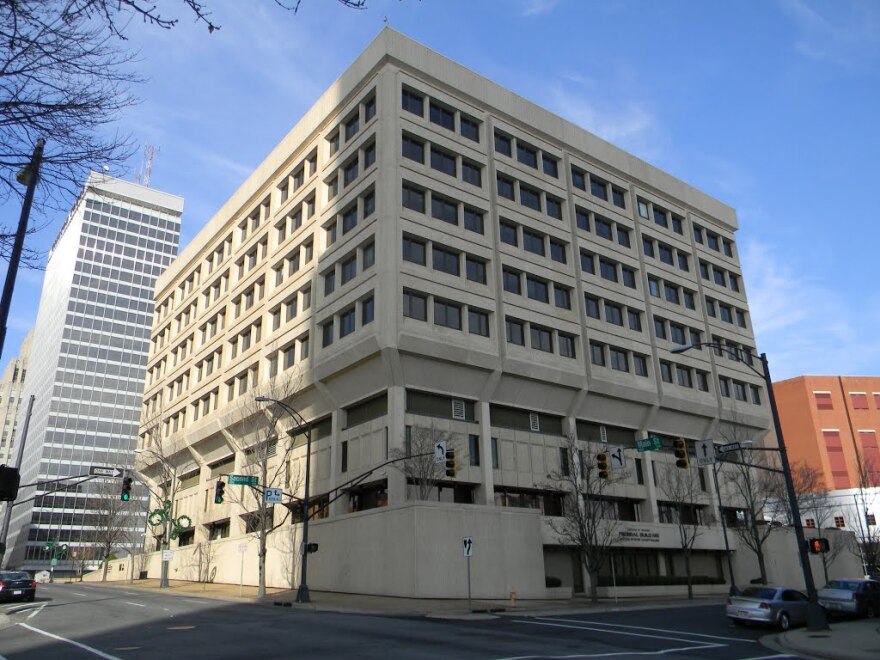A federal trial starts in Winston-Salem on Monday morning that will have big implications for voting rights in North Carolina and, potentially, across the country. The U.S. Justice Department and several groups are suing North Carolina over the sweeping election overhaul it passed two years ago. Federal appeals court judges have already indicated that some of the changes likely violate the Voting Rights Act.
For decades in North Carolina, African-American voter turnout lagged far behind white turnout. Then in 2000, state lawmakers opened up an early voting period. In 2005, they said voters could cast ballots outside their assigned precinct. And in 2007, they enabled same-day registration.
After those changes, attorney Allison Riggs says African-American voter registration and turnout surged.
"They had their intended effect of evening the playing field in the state," she says, "and the legislature yanked that away."
Riggs represents the League of Women Voters, one of the groups suing North Carolina over the election overhaul.
The state NAACP calls it a monster voter suppression bill. The Republican lawmakers behind it say it's common-sense legislation that'll prevent fraud.
It requires voters to show ID. It eliminates out-of-precinct voting and same-day registration. And here's another change then-U.S. Attorney General Eric Holder highlighted when the Justice Department announced it too was suing:
"It is especially troubling that the law would significantly narrow the early voting window that enabled hundreds of thousands of North Carolinians, including a disproportionately large number of minority voters, to cast ballots," Holder said.
In the past two presidential elections, about 70 percent of African-Americans who voted in North Carolina voted early. That compares to about 50 percent of whites.
The overhaul cut the early voting period by seven days, although it requires most counties to still offer the same total hours they did before.
Attorney Chris Brook of the North Carolina ACLU says overall, "the measures that were passed here in North Carolina are among the most restrictive, if not the most restrictive, in the nation."
Republican legislatures in Wisconsin, Ohio and Texas, for example, have passed some combination of what North Carolina did but not altogether.
Brook says with the changes here, "assessing whether they comport with the Voting Rights Act and with the Constitution will go a long way to deciding whether measures along these lines are going to be upheld in other portions of the nation."
What the case means for the rest of the country is actually a key part of the state's defense of the law, too.
Thomas Farr is a Raleigh attorney representing North Carolina. When a federal appeals court heard arguments over putting the changes on hold for last year's election, Farr pointed out that South Carolina does not have out-of-precinct voting.
"If the court would order North Carolina to count out-of-precinct ballots, you have the same history of discrimination, unfortunately, and you have the same socioeconomic conditions in South Carolina," Farr told the judges. "So you're saying that it would be OK for a plaintiff to sue in South Carolina."
There's also Virginia, which doesn't even have early voting but still saw African-American turnout surge in the past two presidential elections. Farr asked if similar increases in North Carolina say more about the Obama campaign than voting policies.
He also emphasized that the election overhaul, as it's written, makes zero changes based on race.
"How can there be unequal opportunity when all voters have the right to register 25 days before the election?" he said. "The statute itself is facially neutral."
But two of the three appeals court judges ruled the effect of the law is not neutral – it'll disproportionately impact African-Americans, and it likely violates the Voting Rights Act.
"Likely" is the key word. The judges were not deciding the fate of the law, just whether it should be put on hold before the full trial that starts Monday morning.
This trial will focus on the early voting, same-day registration and out-of-precinct changes. Voter ID will not be part of it. That's because state lawmakers passed a new bill watering down the ID requirement last month, and the judge is giving the attorneys more time to sort out how that affects their case.

